英语论文写作指导 (仅供参考)
英语论文写作技巧
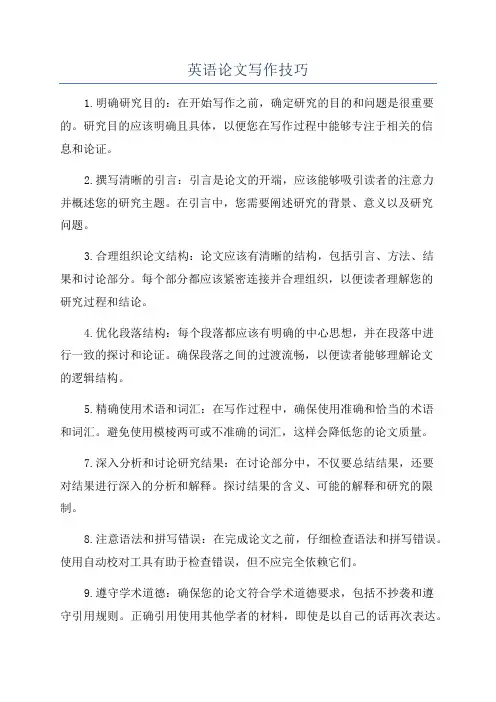
英语论文写作技巧
1.明确研究目的:在开始写作之前,确定研究的目的和问题是很重要的。
研究目的应该明确且具体,以便您在写作过程中能够专注于相关的信
息和论证。
2.撰写清晰的引言:引言是论文的开端,应该能够吸引读者的注意力
并概述您的研究主题。
在引言中,您需要阐述研究的背景、意义以及研究
问题。
3.合理组织论文结构:论文应该有清晰的结构,包括引言、方法、结
果和讨论部分。
每个部分都应该紧密连接并合理组织,以便读者理解您的
研究过程和结论。
4.优化段落结构:每个段落都应该有明确的中心思想,并在段落中进
行一致的探讨和论证。
确保段落之间的过渡流畅,以便读者能够理解论文
的逻辑结构。
5.精确使用术语和词汇:在写作过程中,确保使用准确和恰当的术语
和词汇。
避免使用模棱两可或不准确的词汇,这样会降低您的论文质量。
7.深入分析和讨论研究结果:在讨论部分中,不仅要总结结果,还要
对结果进行深入的分析和解释。
探讨结果的含义、可能的解释和研究的限制。
8.注意语法和拼写错误:在完成论文之前,仔细检查语法和拼写错误。
使用自动校对工具有助于检查错误,但不应完全依赖它们。
9.遵守学术道德:确保您的论文符合学术道德要求,包括不抄袭和遵
守引用规则。
正确引用使用其他学者的材料,即使是以自己的话再次表达。
关于论文写作的指导(英文版)
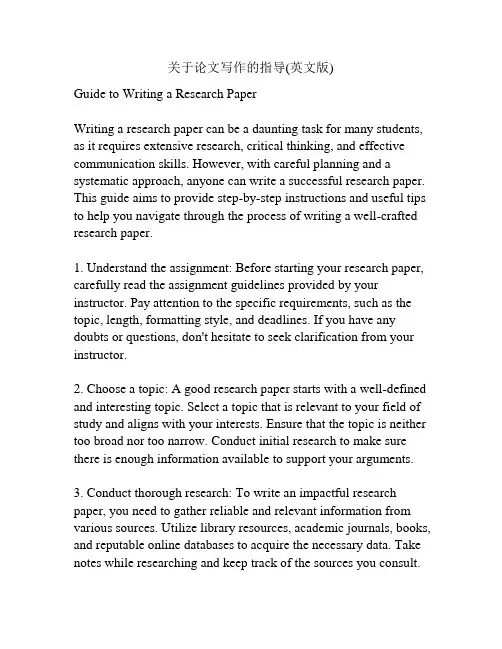
关于论文写作的指导(英文版)Guide to Writing a Research PaperWriting a research paper can be a daunting task for many students, as it requires extensive research, critical thinking, and effective communication skills. However, with careful planning and a systematic approach, anyone can write a successful research paper. This guide aims to provide step-by-step instructions and useful tips to help you navigate through the process of writing a well-crafted research paper.1. Understand the assignment: Before starting your research paper, carefully read the assignment guidelines provided by your instructor. Pay attention to the specific requirements, such as the topic, length, formatting style, and deadlines. If you have any doubts or questions, don't hesitate to seek clarification from your instructor.2. Choose a topic: A good research paper starts with a well-defined and interesting topic. Select a topic that is relevant to your field of study and aligns with your interests. Ensure that the topic is neither too broad nor too narrow. Conduct initial research to make sure there is enough information available to support your arguments.3. Conduct thorough research: To write an impactful research paper, you need to gather reliable and relevant information from various sources. Utilize library resources, academic journals, books, and reputable online databases to acquire the necessary data. Take notes while researching and keep track of the sources you consult.4. Develop a thesis statement: A strong thesis statement is the focal point of your research paper. It presents the main argument or hypothesis that you will support throughout your paper. Your thesis statement should be clear, concise, and debatable. Make sure it reflects the purpose of your paper and guides your research and writing process.5. Create an outline: An outline serves as a roadmap for your research paper, making the writing process more organized and efficient. It includes the main sections and subsections of your paper, along with the key points you will discuss in each section. This will help you maintain a logical flow and ensure that you cover all the necessary information.6. Write a compelling introduction: The introduction is the first impression of your research paper. Start with a catchy hook to grab the reader's attention. Provide background information on the topic and gradually narrow it down to your thesis statement. Clearly state the purpose and significance of your research, and explain how your paper will contribute to the existing body of knowledge.7. Present a comprehensive literature review: A literature review demonstrates your understanding of the existing research on your topic. Summarize the key findings of relevant studies and identify any gaps in the literature. Make sure to cite all the sources properly and critically analyze the information presented.8. Methodology: In this section, describe the research methods you used to collect and analyze data. Clearly explain your approach, including the sample size, data collection instruments, andstatistical analysis methods. This will allow readers to evaluate the reliability and validity of your findings.9. Present your findings: Share the results of your research in a logical and coherent manner. Use graphs, tables, and figures to illustrate your findings effectively. Interpret the results and explain their significance in relation to your research question. Remain objective and avoid making unsupported claims or overgeneralizing your findings.10. Conclusion: Summarize the main points of your research and review how they support your thesis statement. Discuss the implications of your findings and suggest further areas of research. End your conclusion with a thought-provoking statement or a call to action.11. Revise and edit: The final step in writing a research paper is revising and editing. Review your paper for clarity, coherence, grammar, and punctuation errors. Ensure that your paper adheres to the formatting style required by your instructor. Consider seeking feedback from a peer or instructor to gain valuable insights and make necessary improvements.In conclusion, writing a research paper requires careful planning, extensive research, and effective communication skills. By following this guide, you can navigate through the process with confidence and produce a well-structured and impactful research paper. Remember to allow yourself enough time for each step and seek help when needed.继续写相关内容,1500字12. Citations and References: In academic writing, it is crucial to give credit to the original sources of information and ideas. Proper citations and references not only demonstrate academic integrity but also allow readers to locate and verify the sources. Different disciplines may follow different citation styles, such as APA, MLA, or Chicago. Familiarize yourself with the specific guidelines and consistently apply them throughout your research paper. Keep track of your sources from the beginning and create a bibliography or reference list as you go along.13. Revise and Edit: Once you have completed the initial draft of your research paper, it is important to revise and edit it thoroughly. Revision involves rethinking, reorganizing, and rewriting sections for better clarity and coherence. Check for any gaps in your argumentation or supporting evidence. Make sure that your ideas flow logically and that each paragraph contributes to the overall argument. Edit your paper for grammar, spelling, and punctuation errors. It can be helpful to read your paper aloud or ask someone else to read it and provide feedback. Remember that revising and editing is an ongoing process, and it may take multiple rounds before your research paper is polished and ready for submission. 14. Pay Attention to Formatting: In addition to citations and references, it is important to pay attention to the overall formatting of your research paper. Follow the guidelines provided by your instructor regarding font size, margins, line spacing, and page numbering. Consider using headings and subheadings to organize your paper and make it easier to navigate. Make sure that all tables, figures, and illustrations are properly labeled and referred to in the text. A well-formatted research paper not only looks professionalbut also enhances readability and comprehension.15. Seek Feedback and Proofreading: Before submitting your research paper, it is beneficial to seek feedback from others. Share your paper with classmates, colleagues, or your instructor and ask for their opinions and suggestions. They may be able to point out any inconsistencies, weaknesses in your argument, or areas that need further clarification. Consider their feedback and make necessary revisions. Additionally, it is essential to have your research paper proofread by someone else or use proofreading tools and software. Even the most careful writers can overlook errors, and a fresh pair of eyes can catch mistakes that you may have missed.16. Practice Time Management: Writing a research paper can be time-consuming, so it is important to manage your time effectively. Break down the task into smaller, manageable steps and set deadlines for each step. Use a planner or online tools to schedule your research, writing, and revision sessions. Start working on your research paper well in advance to avoid any last-minute rush. It is also a good idea to allocate extra time for unexpected challenges or delays. By managing your time efficiently, you can reduce stress and produce a high-quality research paper.17. Emphasize Clarity and Coherence: Clarity and coherence are essential qualities of a well-written research paper. Make sure that your ideas are expressed clearly and concisely. Avoid using jargon or overly complex language that may confuse readers. Use transition words and phrases to create smooth transitions between paragraphs and sections. The overall structure of your paper shouldbe coherent, with each section and paragraph contributing to the central argument. Regularly review your work to ensure that your ideas are presented logically and that readers can easily follow your thought process.18. Practice Ethical Research Conduct: Conducting research ethically is crucial to maintain the integrity of your research paper and respect the rights and privacy of others. Obtain proper permission and informed consent when conducting surveys, interviews, or experiments involving human subjects. Follow ethical guidelines when conducting research involving animals. When using other researchers' work, ensure proper citation and acknowledgment. Avoid plagiarism by paraphrasing and quoting sources accurately. Familiarize yourself with your institution's policies on research ethics and ensure that your research adheres to ethical standards.19. Take Care of Your Mental and Physical Well-being: Writing a research paper can be mentally and physically demanding. It is important to take care of yourself throughout the process. Take breaks, engage in physical activities, and maintain a balanced diet. Get enough sleep and manage your stress levels effectively. If you feel overwhelmed or stuck, don't hesitate to seek support from your classmates, instructors, or tutors. Remember that it is normal to experience challenges and setbacks during the research paper writing process, and taking care of your well-being can help you overcome them more effectively.20. Finalize and Submit: After incorporating feedback and making all necessary revisions, it is time to finalize your research paper.Review the formatting, citations, and references one last time to ensure accuracy and consistency. Proofread your work for any remaining errors. Once you are confident that your research paper is polished and meets all the requirements, submit it on time following the submission guidelines provided by your instructor. Celebrate your hard work and the accomplishment of completing your research paper!Writing a research paper may seem challenging at first, but by following these steps, you can approach the task with confidence and produce a high-quality paper. Remember that writing is a process, and it requires time, effort, and perseverance. Do not hesitate to seek help and guidance when needed. With practice and experience, you will become more proficient in writing research papers and communicating your ideas effectively.。
英语议论文的写作方法与技巧(优秀5篇)
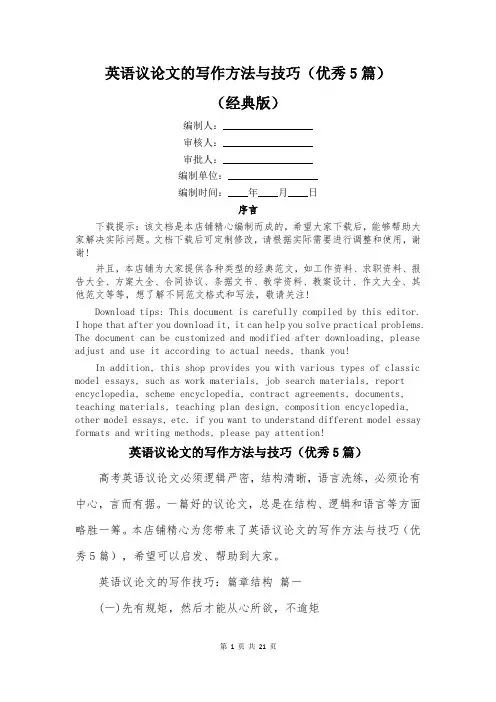
英语议论文的写作方法与技巧(优秀5篇)(经典版)编制人:__________________审核人:__________________审批人:__________________编制单位:__________________编制时间:____年____月____日序言下载提示:该文档是本店铺精心编制而成的,希望大家下载后,能够帮助大家解决实际问题。
文档下载后可定制修改,请根据实际需要进行调整和使用,谢谢!并且,本店铺为大家提供各种类型的经典范文,如工作资料、求职资料、报告大全、方案大全、合同协议、条据文书、教学资料、教案设计、作文大全、其他范文等等,想了解不同范文格式和写法,敬请关注!Download tips: This document is carefully compiled by this editor.I hope that after you download it, it can help you solve practical problems. The document can be customized and modified after downloading, please adjust and use it according to actual needs, thank you!In addition, this shop provides you with various types of classic model essays, such as work materials, job search materials, report encyclopedia, scheme encyclopedia, contract agreements, documents, teaching materials, teaching plan design, composition encyclopedia, other model essays, etc. if you want to understand different model essay formats and writing methods, please pay attention!英语议论文的写作方法与技巧(优秀5篇)高考英语议论文必须逻辑严密,结构清晰,语言洗练,必须论有中心,言而有据。
英语论文写作技巧

摘要撰写的主要问题
撰写的篇幅过长,伴随很多冗余的描述性 语句 时态混乱 习惯了中文写作的主谓宾结构,使用的句 子结构单一,多为简单陈述句
Eg:We find the pollutant sources, get the environmental quality’s evolution pattern and know some ways to reduce pollutant sources. And finally we hope that it could be used to keep the pollution trend within limits.
Title,Abstract和Introduction部分往往是被 评阅者读得最多的,评阅者会根据这些内容 产生对文章的第一印象。 一篇论文赢得评阅者的多 少好印象,在很 大程度上取决于Title,Abstract和 Introduction 写得好坏。
标题 Title
基本要求:精准(Accuracy),简洁(Brevity),清 晰(Clarity) 英语科技论文中,标题不宜过长,大多为8— 12个单词左右。 Title往往由名词性短语构成,如果出现动词, 多为动名词或分词形式。 内容层次很多的情况下,可采用主副标题相结 合的形式;应将核心内容的主题词放在提名前 面的位置。 Eg: An effective statistical approach on……
语言技巧
(1)注意句子上下连贯,不能让句子独立。常见的连接词有,However, also, in addition, consequently, afterwards, moreover, Furthermore, further, although, unlike, in contrast, Similarly, Unfortunately, alternatively, parallel results, In order to, despite, For example, Compared with, other results, thus, therefore……用好连接词能使文章 层次清楚,意思明确。 (2) 注意段落布局的整体逻辑:经常我们要叙述一个问题的几个方面。 这种情况下,一定要注意逻辑结构。第一段要明确告诉读者你要讨论 几个部份……Therefore, there are three aspects of this problem have to be addressed. The first question involves……The second problem relates to……The third aspect deals with……清晰地把观点逐层叙述。也 可以直接用First, Second, Third, Finally……当然,Furthermore, in addition等可以用来补充说明。
写作英文论文的方法和技巧
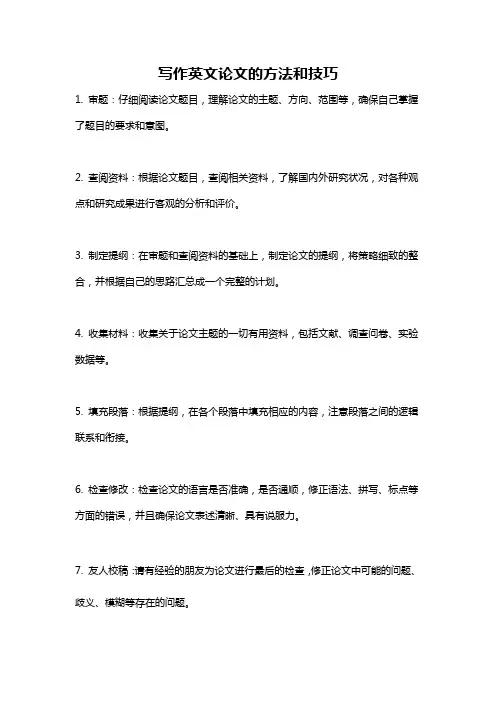
写作英文论文的方法和技巧
1. 审题:仔细阅读论文题目,理解论文的主题、方向、范围等,确保自己掌握了题目的要求和意图。
2. 查阅资料:根据论文题目,查阅相关资料,了解国内外研究状况,对各种观点和研究成果进行客观的分析和评价。
3. 制定提纲:在审题和查阅资料的基础上,制定论文的提纲,将策略细致的整合,并根据自己的思路汇总成一个完整的计划。
4. 收集材料:收集关于论文主题的一切有用资料,包括文献、调查问卷、实验数据等。
5. 填充段落:根据提纲,在各个段落中填充相应的内容,注意段落之间的逻辑联系和衔接。
6. 检查修改:检查论文的语言是否准确,是否通顺,修正语法、拼写、标点等方面的错误,并且确保论文表述清晰、具有说服力。
7. 友人校稿:请有经验的朋友为论文进行最后的检查,修正论文中可能的问题、歧义、模糊等存在的问题。
英语本科毕业论文写作指导
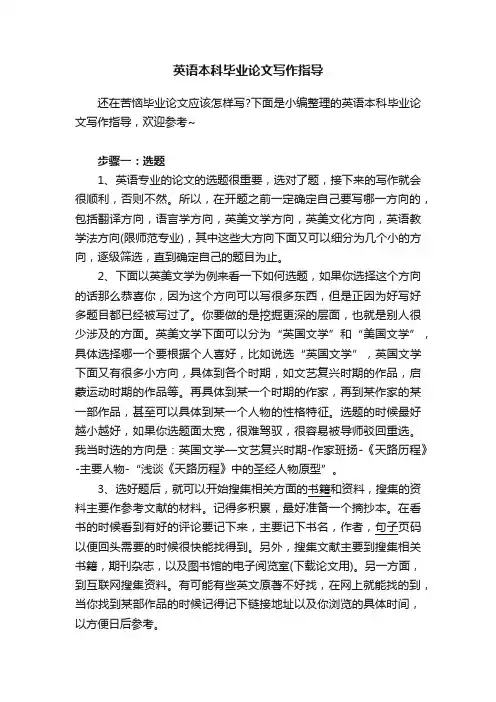
英语本科毕业论文写作指导还在苦恼毕业论文应该怎样写?下面是小编整理的英语本科毕业论文写作指导,欢迎参考~步骤一:选题1、英语专业的论文的选题很重要,选对了题,接下来的写作就会很顺利,否则不然。
所以,在开题之前一定确定自己要写哪一方向的,包括翻译方向,语言学方向,英美文学方向,英美文化方向,英语教学法方向(限师范专业),其中这些大方向下面又可以细分为几个小的方向,逐级筛选,直到确定自己的题目为止。
2、下面以英美文学为例来看一下如何选题,如果你选择这个方向的话那么恭喜你,因为这个方向可以写很多东西,但是正因为好写好多题目都已经被写过了。
你要做的是挖掘更深的层面,也就是别人很少涉及的方面。
英美文学下面可以分为“英国文学”和“美国文学”,具体选择哪一个要根据个人喜好,比如说选“英国文学”,英国文学下面又有很多小方向,具体到各个时期,如文艺复兴时期的作品,启蒙运动时期的作品等。
再具体到某一个时期的作家,再到某作家的某一部作品,甚至可以具体到某一个人物的性格特征。
选题的时候最好越小越好,如果你选题面太宽,很难驾驭,很容易被导师驳回重选。
我当时选的方向是:英国文学—文艺复兴时期-作家班扬-《天路历程》-主要人物-“浅谈《天路历程》中的圣经人物原型”。
3、选好题后,就可以开始搜集相关方面的书籍和资料,搜集的资料主要作参考文献的材料。
记得多积累,最好准备一个摘抄本。
在看书的时候看到有好的评论要记下来,主要记下书名,作者,句子页码以便回头需要的时候很快能找得到。
另外,搜集文献主要到搜集相关书籍,期刊杂志,以及图书馆的电子阅览室(下载论文用)。
另一方面,到互联网搜集资料。
有可能有些英文原著不好找,在网上就能找的到,当你找到某部作品的时候记得记下链接地址以及你浏览的具体时间,以方便日后参考。
步骤二:开题报告1、开题报告的写作很讲究,如果你开题报告确定了,那么就可以开始写正文了。
开题报告包括5部分:Title(题目),background(国内外研究现状),influence(选题目的和意义),Thesis statement(主题),Outline(提纲),Bibliography(参考文献)。
论文中的英文写作技巧与表达方式
论文中的英文写作技巧与表达方式在英文学术论文的写作过程中,准确和流畅的表达是非常重要的。
本文将探讨一些论文中的英文写作技巧及表达方式,帮助读者提升论文写作的能力。
1. 写作结构论文的结构对于阐明观点、组织思路至关重要。
以下是一般英文学术论文的常见结构:(1)引言:介绍论文的主题,概述论文的目的和重要性,并提供背景知识。
(2)文献综述:回顾相关的学术研究和理论,评估前人的研究成果。
(3)方法论:描述研究方法、实验设计和数据分析方法。
(4)结果:对实验结果进行客观的描述和分析。
(5)讨论:解释和解读结果,并与前人的研究进行比较和讨论。
(6)结论:总结研究成果,强调重要性和可能的进一步研究方向。
2. 语法和拼写良好的语法和拼写是论文写作的基础。
以下是一些常见的语法和拼写错误,需要注意避免:(1)主谓一致:主语和谓语动词在人称和单复数上要保持一致。
(2)时态一致:使用正确的时态表达,如过去时、现在时或将来时等。
(3)冠词使用:正确使用冠词(a、an、the),并避免过度使用。
(4)拼写错误:仔细校对论文中的拼写错误,可以使用拼写检查工具进行辅助。
3. 学术词汇在写作过程中,合适的学术词汇能够提升论文的专业程度,但过度使用学术词汇反而会让读者难以理解。
以下是一些建议:(1)避免使用口语化的表达方式,如俚语或缩写。
(2)使用学术词汇丰富论文内容,但确保这些词汇确实适用于所描述的概念。
(3)使用词汇表达准确的思想和观点,同时避免以讹传讹,对所使用词汇的准确性要有严谨要求。
4. 表达清晰在论文写作中,清晰的表达是非常重要的。
以下是一些建议:(1)使用简洁的句子结构和控制篇幅,避免过长的句子或段落。
(2)使用逻辑的连接词,如"however"、"therefore"、"in addition"等,帮助读者理解论文的逻辑。
(3)对于复杂的概念,使用图表或实例来解释,以帮助读者更好地理解。
英语论文写作指导 (仅供参考)
英语论文写作课复习资料(仅供参考)Lecture 1 General introduction1. The basic concept of academic research paper writingThe concept: “Research ”---something new, something of significance, something that can promote scholarship, science and technology, productivity and human growth, for thebetterment of the well-being of mankind.2. Characteristics of academic paperA. Scientific--- based on scientific theories and objective data, and the problem is approachedwith a scientific attitude and methodology.The conclusion is backed up by reliableevidence, the analysis or exposition is logically sound.B. Scholarly --- more or less theoretical and concerned with academic matters.The subjectunder discussion or investigation and the conclusion to be drawn are academicallysignificant.C. Original --- a new perspective or method, develops new arguments or conclusions,or evenmakes a breakthrough in a certain field.The graduation paper is a special form of academic paper characterized by being scholarly,scientific and original to the greatest extent possible.3. The style of academic writingA. Formal because it is written in standard language and in formal style devoid ofcontractions,ellipses,slangy words,vulgarisms,etc.B. Substantial because it deals with academically important and serious issues and is ofsubstance and length.C. Well-documented because it rigidly follows the rules of citation and documentation with allborrowed ideas or facts fully acknowledged in the notes and bibliography.4. The requirements of an academic paper.1) A scientific attitude,a rigorous study style, a creative mind, and a great courage toexplore unknown academic areas, discovering or solving problems in the academic orscientific fields.2)Basic knowledge of academic research--- its nature, value, and significance,essentialfeatures, techniques and methods,etc.To learn more about the academic circle and thesociety by searching through all sorts of reference materials originating in academic andsocial studies.3) To know about scholarship, such as how to find subjects to investigate, how to collectand evaluate source materials, how to develop their own ideas.5. Components parts of an academic paper1) English title and Chinese title of your paper2) Abstract both in English and in Chinese and key words3) Key words in English and Chinese4) Contents5) Introduction6) Materials and methods used in the research (theories, tools, approaches, etc.)7) Facts and figures in the analysis, pros and cons in the argumentation or points ofview in the exposition;8) Research results or findings;9) Conclusion.6. The steps of paper writing1) Choosing a topic: a tentative topic, a preliminary thesis statement2) Making a thesis proposal:3) Data collection and evaluation: a working bibliography4) Thesis formulation (presentation or statement)5) Organization of ideas;6) Writing and revising of the paper;7) Finalizing of the paper.Research paper writing are more often with starts and stops,setbacks and reverses,even dead ends, especially in the preparatory stages. It is only after constant efforts,repeated modifications and alternations that you come to a satisfactory end and get everything finalized.7. Start working on your thesis:1) Be clear about your aims and intention: what to investigate or research into, what to writeabout.2). Choose a good topic: a tentative topic, narrowing your focus only on one of the issues, toan appropriate topic, considering your capability, limit of time, limit of references you can find.You may begin by inquiring into what is known to people on a certain subject;then by making comparisons or contrasts and passing judgment,you perceive loopholes, inaccuracies,errors or fallacies;by analyzing the correct and the incorrect,you draw conclusions of your own and develop some new ideas or views on the topic under discussion.3) Reading: d oing extensive and intensive reading, evaluating source materials and takingnotes of important and relevant information or points of view in your reading. Sorting out useful materials you have collected and developing your ideas.4) Writing an outline: p lan the paper with great care and draw a good outline, organizingyour thoughts for the writing of the paper with unity,coherence clarity and accuracy.5) Follow the writing conventions and paper format strictly: a ttach carefully and correctlymade notes and bibliography to the end of the paper, documenting properly the sources you have made use of.6) Guard against plagiarism: making of notes and bibliography.Lecture 2 How to choose a topicTo choose a topic is the first step of preparation for your research and research paper writing.You must decide on what to research into and what to write about,namely,to discover the subject for your research and choose the topic for your research paper.1. The two broad types:Research areas may be divided into two broad types:theoretical and practical.The theoretical type is theory-oriented.The practical is application-oriented.Theory and practice always walk hand in hand,and in fact they are usually combined in papers,which may be more theoretical or practical.2. Academic areas for the English majors of our universityThere are five areas for research and confine your topics to English-related areas and subjects as listed below:1) The Area of Language studies (linguistics),including English morphology,syntax,semantics, etymology,rhetoric,stylistics,pragmatics,all branches of English linguistics and their comparisons with the Chinese counterparts;Pure language study of English on its structure and elements such as peculiarities,phonetics,grammar,vocabulary,discourse,comparisons of English dialects,Briticism,Americanism,Australianism, etc.2) Applied linguistics: English for Specific Purposes (ESP).Studies of ESP: TESL (Teaching English as a Second Language); TEFL(Teaching English as a Foreign Language),and any special know-how or expertise concerning English in use.Nowadays,language teaching and learning is becoming an independent discipline with its own theory and practice, including:a. To study psychological mechanisms of language teaching and learning;b. To study the methods of teachers’ teaching and students’ learning of the English language;c. To compare the acquisition of the mother tongue with that of a foreign language,discuss theimprovement and application of modem teaching approaches and facilities,or even make comments on and evaluate text-books in use,etc.If you want to be more theoretical,you can try any branch of linguistics and its application to language teaching and learning and the second language acquisition.3)Area of literary studies,including :British,American,Australian,Canadian.South-African literature,comparisons between them,and their comparisons with Chinese literature;To apply literary theories and critical methodology to the study of writers and works,literary trends and schools,literary periods,literary criticism, etc.4)The area of translation and practice,including theories and mechanics,written translation and oral interpretation;In the area of translation,you can research into:a. The origin and growth of translation practice and theory;b. Different theoretical schools and their doctrines on translation;c. Standards and criteria for the quality of translation;d. Methods and techniques for doing translation of various kinds;e. Teaching of translation as a basic language skill,etc.5) The area of cross-culture studies:Comparisons of religions,philosophies,educations(?),habits and customs of different countries and races,as well as means of intercultural communication.3.To choose topics1) First step to discover a subject in one area:a. You may use your personal experiences,for example,attending a lecture or a course;reading anewspaper,a journal,a book or a novel;watching a movie,a TV program and so on.b.You may also talk with others,your fellow students,your friends,and your teachers in particular,to get enlightenment.c. The most important thing for you to do is to get help from source materials,such as a table of contents,a book’s index,an encyclopedia article,headlines in periodical indexes,etc.After you have discovered the subject that suits you,you should further find a specific topic under the chosen subject.2) Three standards.a. Interesting to you.An interesting topic will give you great impetus for the successful fulfillment of your research.b. Significant or worthwhile.Your topic should have obvious or potential theoretical or practical value.c. Workable or manageable.An appropriate topic should be neither too broad,or too narrow.3) Difficulties in choosing a good topic:a. Not fully aware of what is really significant or valuableb. Difficult to subdivide the general subject he has discovered into topics of manageable sizeand complexity.c.The problems of a broad topic:The topic is too general, one on which it is hard to focus your study or to finish a paper of the required length within the stipulated time.The references available may be too many for you to finish reading within the allotted time.Too broad a topic should be narrowed down to a workable size.d. The problems of a narrow topic:a. The topic is too specific,hard to enlarge upon or develop your arguments about.b. It is usually trivial or insignificant.c.You can hardly find enough source materials or references to help in your research.Such atopic should be broadened accordingly.Therefore, choosing a good topic for research and research paper writing could be much more difficult than expected.The difficulty usually is not that the researcher is ignorant of what holds interest for him, but hard to have clear ideas.4) Judgments of the significance or value:Your awareness of the significance or value of the topic to be chosen largely depends on:a. What aspects of your topic have or have not been explored;b. What are the findings,old and new;c. What are controversies therein;d. What are the loopholes, inaccuracies, errors, fallacies.5)The appropriateness of the topic:a. The length of the paper as required, for example, your graduation paper required about4,000 words;b. The amount of time you can afford;c. The availability of information you need for the research;Taking these factors into account,you decide whether your topic is too broad,or too narrow.3.To adjust your topic1) Narrow down an abroad topic:If your initial topic is too broad,you can narrow it down by m oving step by step from a broad to a narrow and still a narrow topic until you get the suitable one:2) Broaden a narrow topicIf your topic happens to be too narrow,you can also seek help from the periodical indexes and your adviser,or broaden it step by step by reversing the narrowing process as illustrated above.In short, when choosing a topic, you have to consider the significance of your research, your audience or readers, your writing situation, the availability of source materials, and other relevant conditions, which all contribute to the success of your research and research paper writing.Remember to consult your tutor or supervisor for advice.Lecture 3 Preliminary Bibliography1.Making a thesis proposal1) Preliminary bibliography:1) find the references available.2) reading source materials;3) previous achievements of the subject your choose;2) To discuss with your tutor1)The topic→The titles of academic articles (a tentative title)2)The anticipated result (hypothesis)3) Write a proposal:a. What is the subject you have discovered?b. Why do you take interest in this subject?c. What methods do you intend to adopt?d. How are the source materials you have read or mean to read related to the subject?e. What is the relationship between the previous achievements of others and your anticipatedresults?f. What practical and/or theoretical value do you think your research might have?g. What are the limitations of your methods and materials,and the difficulties you maypossibly encounter?h. How do you plan to overcome these difficulties?The proposal gives the plan and the procedures you mean to follow, the background of the research, and discusses the anticipated results of your research in relation to the previous achievements of others and their potential value in theory and practice,as well as possible limitations of your research and difficulties you might meet with.2. Choosing methods and approaches.(注: 一定根据研究内容和题目确定研究方法。
如何写好英文论文
如何写好英文论文写一篇出色的英文论文是每个研究生或学术研究者的追求。
然而,许多人在写作过程中会遇到各种困难。
下面将分享一些关键技巧,帮助您写好英文论文。
1. 研究和分析在撰写英文论文之前,必须进行充分的研究和分析。
这包括查阅相关的文献和研究成果,并将其整理成有逻辑性的论证链。
确定研究问题并进行深入的分析,以确保论文的内容有深度和独创性。
2. 结构和组织一个良好的英文论文应该具有清晰的结构和组织。
文章的开头应引起读者的兴趣,利用一个引人入胜的问题或令人难以置信的事实来捕捉读者的注意力。
在每个段落中,包括一个主题句,帮助读者理解自己的思路。
同时,确保论文的发展逻辑连贯,并且按照合理的顺序进行。
3. 使用正确的语法和拼写写作过程中,正确的语法和拼写是至关重要的。
定期检查文章中的拼写错误,并使用语法检查工具以确保文章的准确性。
此外,还要注意使用正确的时态和语气,避免使用口语或俚语表达,以保证文章的正式性和学术性。
4. 平衡引用和原创性在写作英文论文时,引用其他学者的观点和研究成果是非常重要的。
这可以帮助加强自己的论点,并向读者证明自己的研究的可靠性。
然而,在引用方面要谨慎,并确保通过恰当的方式引用,并标明出处。
此外,保持一定的原创性也很重要,通过自己的分析和见解来增加论文的独特性。
5. 编辑和润色阶段写完初稿后,不要急于提交。
先进行编辑和润色,以确保文章的质量和完整性。
在编辑过程中,注意逻辑和语法的错误,并对论文进行适当的调整和重组。
在润色阶段,重点关注文章的流畅性和细节,确保语言简洁且准确,以及用词精确。
6. 寻求反馈和建议最后,寻求反馈和建议是提高英文论文质量的关键步骤。
向同事、导师或其他专业人士寻求建议,并接受他们的批评和建议。
他们的反馈可以帮助你发现自己文章中的盲点和不足之处,并给出改进的方向。
通过不断修改和改进,最终得到一篇出色的英文论文。
总结起来,写好英文论文需要进行深入的研究,遵循良好的结构和组织,使用正确的语法和拼写,平衡引用和原创性,进行编辑和润色,并寻求反馈和建议。
英语写作中的技巧指导写作指导2篇
英语写作中的技巧指导写作指导英语写作中的技巧指导写作指导精选2篇(一)英语写作中的技巧指导可以包括以下几个方面:1. 收集资料和构思:在开始写作之前,先收集相关资料和思考写作的主题和要点。
可以通过阅读相关的书籍、文章或者进行网络搜索等方式获取必要的素材。
2. 确定写作结构:在开始写作之前,确定文章的结构是非常重要的。
一般来说,英语写作可以包括引言、正文和结论三个部分。
在引言部分简要介绍写作的主题和背景,正文部分展开论述,结论部分总结观点并提出自己的看法。
3. 使用适当的语言:在英语写作中,要尽量使用准确、简洁和清晰的语言表达自己的观点。
避免使用过于复杂和晦涩的词汇和句子结构,以免让读者产生困惑。
4. 注意段落划分:每个段落应该只包含一个主要观点,并且通过合适的过渡词将各个段落连接在一起。
同时,每个段落可以通过提供具体的例子或者支持材料来进一步展开论述。
5. 避免重复和废话:在写作过程中,要注意避免重复的内容和废话。
每句话都应该有明确的目的,同时要尽量用简洁的语言表达自己的观点。
6. 审查和修改:在写完初稿之后,务必花时间审查和修改文章。
检查语法错误、拼写错误和句子结构问题,并且确保文章的逻辑结构和观点表达清晰。
总的来说,英语写作的技巧在于理清思路、表达准确、逻辑清晰和语法正确。
通过不断的练习和反馈,提高自己的写作水平。
英语写作中的技巧指导写作指导精选2篇(二)学习英语写作是一个长期的过程,下面是几个写作指导的建议,帮助你在学习和提高英语写作能力时更加有效和有针对性地进行。
1. 阅读大量英语文学作品和优秀的英语写作范文。
阅读是提高写作能力的最好途径之一,可以帮助你积累词汇和句型表达,提高语感和写作思维。
通过阅读优秀的写作作品,你可以学到如何组织思路,使用恰当的词汇和句子结构,以及塑造生动的文字画面。
2. 多练习写作。
写作是一项需要反复练习的技能,只有不断地动手去写,才能逐渐提高。
可以选择一些话题进行写作练习,例如描述人物、回忆过去的经历、表达观点等。
- 1、下载文档前请自行甄别文档内容的完整性,平台不提供额外的编辑、内容补充、找答案等附加服务。
- 2、"仅部分预览"的文档,不可在线预览部分如存在完整性等问题,可反馈申请退款(可完整预览的文档不适用该条件!)。
- 3、如文档侵犯您的权益,请联系客服反馈,我们会尽快为您处理(人工客服工作时间:9:00-18:30)。
英语论文写作课复习资料(仅供参考)Lecture 1 General introduction1. The basic concept of academic research paper writingThe concept: “Research ”---something new, something of significance, something that can promote scholarship, science and technology, productivity and human growth, for thebetterment of the well-being of mankind.2. Characteristics of academic paperA. Scientific--- based on scientific theories and objective data, and the problem is approachedwith a scientific attitude and methodology.The conclusion is backed up by reliableevidence, the analysis or exposition is logically sound.B. Scholarly --- more or less theoretical and concerned with academic matters.The subjectunder discussion or investigation and the conclusion to be drawn are academicallysignificant.C. Original --- a new perspective or method, develops new arguments or conclusions,or evenmakes a breakthrough in a certain field.The graduation paper is a special form of academic paper characterized by being scholarly,scientific and original to the greatest extent possible.3. The style of academic writingA. Formal because it is written in standard language and in formal style devoid ofcontractions,ellipses,slangy words,vulgarisms,etc.B. Substantial because it deals with academically important and serious issues and is ofsubstance and length.C. Well-documented because it rigidly follows the rules of citation and documentation with allborrowed ideas or facts fully acknowledged in the notes and bibliography.4. The requirements of an academic paper.1) A scientific attitude,a rigorous study style, a creative mind, and a great courage toexplore unknown academic areas, discovering or solving problems in the academic orscientific fields.2)Basic knowledge of academic research--- its nature, value, and significance,essentialfeatures, techniques and methods,etc.To learn more about the academic circle and thesociety by searching through all sorts of reference materials originating in academic andsocial studies.3) To know about scholarship, such as how to find subjects to investigate, how to collectand evaluate source materials, how to develop their own ideas.5. Components parts of an academic paper1) English title and Chinese title of your paper2) Abstract both in English and in Chinese and key words3) Key words in English and Chinese4) Contents5) Introduction6) Materials and methods used in the research (theories, tools, approaches, etc.)7) Facts and figures in the analysis, pros and cons in the argumentation or points ofview in the exposition;8) Research results or findings;9) Conclusion.6. The steps of paper writing1) Choosing a topic: a tentative topic, a preliminary thesis statement2) Making a thesis proposal:3) Data collection and evaluation: a working bibliography4) Thesis formulation (presentation or statement)5) Organization of ideas;6) Writing and revising of the paper;7) Finalizing of the paper.Research paper writing are more often with starts and stops,setbacks and reverses,even dead ends, especially in the preparatory stages. It is only after constant efforts,repeated modifications and alternations that you come to a satisfactory end and get everything finalized.7. Start working on your thesis:1) Be clear about your aims and intention: what to investigate or research into, what to writeabout.2). Choose a good topic: a tentative topic, narrowing your focus only on one of the issues, toan appropriate topic, considering your capability, limit of time, limit of references you can find.You may begin by inquiring into what is known to people on a certain subject;then by making comparisons or contrasts and passing judgment,you perceive loopholes, inaccuracies,errors or fallacies;by analyzing the correct and the incorrect,you draw conclusions of your own and develop some new ideas or views on the topic under discussion.3) Reading: d oing extensive and intensive reading, evaluating source materials and takingnotes of important and relevant information or points of view in your reading. Sorting out useful materials you have collected and developing your ideas.4) Writing an outline: p lan the paper with great care and draw a good outline, organizingyour thoughts for the writing of the paper with unity,coherence clarity and accuracy.5) Follow the writing conventions and paper format strictly: a ttach carefully and correctlymade notes and bibliography to the end of the paper, documenting properly the sources you have made use of.6) Guard against plagiarism: making of notes and bibliography.Lecture 2 How to choose a topicTo choose a topic is the first step of preparation for your research and research paper writing.You must decide on what to research into and what to write about,namely,to discover the subject for your research and choose the topic for your research paper.1. The two broad types:Research areas may be divided into two broad types:theoretical and practical.The theoretical type is theory-oriented.The practical is application-oriented.Theory and practice always walk hand in hand,and in fact they are usually combined in papers,which may be more theoretical or practical.2. Academic areas for the English majors of our universityThere are five areas for research and confine your topics to English-related areas and subjects as listed below:1) The Area of Language studies (linguistics),including English morphology,syntax,semantics, etymology,rhetoric,stylistics,pragmatics,all branches of English linguistics and their comparisons with the Chinese counterparts;Pure language study of English on its structure and elements such as peculiarities,phonetics,grammar,vocabulary,discourse,comparisons of English dialects,Briticism,Americanism,Australianism, etc.2) Applied linguistics: English for Specific Purposes (ESP).Studies of ESP: TESL (Teaching English as a Second Language); TEFL(Teaching English as a Foreign Language),and any special know-how or expertise concerning English in use.Nowadays,language teaching and learning is becoming an independent discipline with its own theory and practice, including:a. To study psychological mechanisms of language teaching and learning;b. To study the methods of teachers’ teaching and students’ learning of the English language;c. To compare the acquisition of the mother tongue with that of a foreign language,discuss theimprovement and application of modem teaching approaches and facilities,or even make comments on and evaluate text-books in use,etc.If you want to be more theoretical,you can try any branch of linguistics and its application to language teaching and learning and the second language acquisition.3)Area of literary studies,including :British,American,Australian,Canadian.South-African literature,comparisons between them,and their comparisons with Chinese literature;To apply literary theories and critical methodology to the study of writers and works,literary trends and schools,literary periods,literary criticism, etc.4)The area of translation and practice,including theories and mechanics,written translation and oral interpretation;In the area of translation,you can research into:a. The origin and growth of translation practice and theory;b. Different theoretical schools and their doctrines on translation;c. Standards and criteria for the quality of translation;d. Methods and techniques for doing translation of various kinds;e. Teaching of translation as a basic language skill,etc.5) The area of cross-culture studies:Comparisons of religions,philosophies,educations(?),habits and customs of different countries and races,as well as means of intercultural communication.3.To choose topics1) First step to discover a subject in one area:a. You may use your personal experiences,for example,attending a lecture or a course;reading anewspaper,a journal,a book or a novel;watching a movie,a TV program and so on.b.You may also talk with others,your fellow students,your friends,and your teachers in particular,to get enlightenment.c. The most important thing for you to do is to get help from source materials,such as a table of contents,a book’s index,an encyclopedia article,headlines in periodical indexes,etc.After you have discovered the subject that suits you,you should further find a specific topic under the chosen subject.2) Three standards.a. Interesting to you.An interesting topic will give you great impetus for the successful fulfillment of your research.b. Significant or worthwhile.Your topic should have obvious or potential theoretical or practical value.c. Workable or manageable.An appropriate topic should be neither too broad,or too narrow.3) Difficulties in choosing a good topic:a. Not fully aware of what is really significant or valuableb. Difficult to subdivide the general subject he has discovered into topics of manageable sizeand complexity.c.The problems of a broad topic:The topic is too general, one on which it is hard to focus your study or to finish a paper of the required length within the stipulated time.The references available may be too many for you to finish reading within the allotted time.Too broad a topic should be narrowed down to a workable size.d. The problems of a narrow topic:a. The topic is too specific,hard to enlarge upon or develop your arguments about.b. It is usually trivial or insignificant.c.You can hardly find enough source materials or references to help in your research.Such atopic should be broadened accordingly.Therefore, choosing a good topic for research and research paper writing could be much more difficult than expected.The difficulty usually is not that the researcher is ignorant of what holds interest for him, but hard to have clear ideas.4) Judgments of the significance or value:Your awareness of the significance or value of the topic to be chosen largely depends on:a. What aspects of your topic have or have not been explored;b. What are the findings,old and new;c. What are controversies therein;d. What are the loopholes, inaccuracies, errors, fallacies.5)The appropriateness of the topic:a. The length of the paper as required, for example, your graduation paper required about4,000 words;b. The amount of time you can afford;c. The availability of information you need for the research;Taking these factors into account,you decide whether your topic is too broad,or too narrow.3.To adjust your topic1) Narrow down an abroad topic:If your initial topic is too broad,you can narrow it down by m oving step by step from a broad to a narrow and still a narrow topic until you get the suitable one:2) Broaden a narrow topicIf your topic happens to be too narrow,you can also seek help from the periodical indexes and your adviser,or broaden it step by step by reversing the narrowing process as illustrated above.In short, when choosing a topic, you have to consider the significance of your research, your audience or readers, your writing situation, the availability of source materials, and other relevant conditions, which all contribute to the success of your research and research paper writing.Remember to consult your tutor or supervisor for advice.Lecture 3 Preliminary Bibliography1.Making a thesis proposal1) Preliminary bibliography:1) find the references available.2) reading source materials;3) previous achievements of the subject your choose;2) To discuss with your tutor1)The topic→The titles of academic articles (a tentative title)2)The anticipated result (hypothesis)3) Write a proposal:a. What is the subject you have discovered?b. Why do you take interest in this subject?c. What methods do you intend to adopt?d. How are the source materials you have read or mean to read related to the subject?e. What is the relationship between the previous achievements of others and your anticipatedresults?f. What practical and/or theoretical value do you think your research might have?g. What are the limitations of your methods and materials,and the difficulties you maypossibly encounter?h. How do you plan to overcome these difficulties?The proposal gives the plan and the procedures you mean to follow, the background of the research, and discusses the anticipated results of your research in relation to the previous achievements of others and their potential value in theory and practice,as well as possible limitations of your research and difficulties you might meet with.2. Choosing methods and approaches.(注: 一定根据研究内容和题目确定研究方法。
